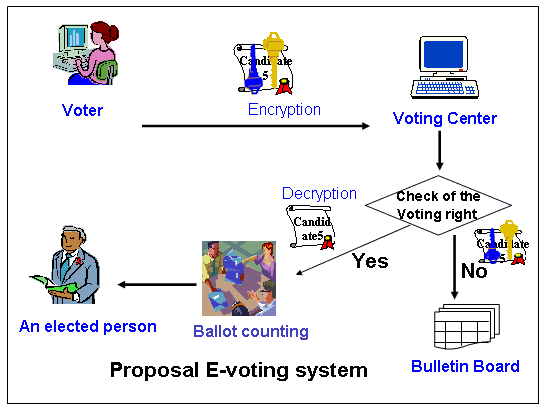Electronic Voting System
[Abstract]
With the birth of a vast telecommunications network such as the Internet,
there has been a significant change in the quality and way of life. Such
change also makes itself prominent in political paradigm and manifested
itself as "e-Government." This concept had its origin in the declaration
by the Clinton Administration at its onset which stated, 'We would like
to take advantage of information technology to enhance the quality of life
of our citizens and breath new life into economy.' A 'small and efficient
government' is the fundamental ideology of e-Government. "e-Politics,"
a political paradigm in a new space by relying on such medium, was born.
Ultimately, this is manifested as a form where the current reality of
political space has been transferred to a network space that we call
the Internet. This e-Politics can not only realize savings on significant
cost, time, and manpower required for the current political activities but
also forms a basis from which we will be able to step closer to realizing
direct democracy that enhances political participation by citizens by
supplementing problems related to representational democracy of the day.
Various political parties and politicians engage in promotion and opinion
gathering on political issues, discussions, and donation receipt through
websites. Political activities in cyberspace are now coming to the fore
as one of the important political methods. We would like to conduct research
on the area of e-voting, one of the most critical areas of e-Politics.
There are a number of voting methods currently being employed by various
countries. But, the losses related to manpower, time, and money in carrying
out voting are still far too great for most countries. Moreover, at the
moment, the voters' political indifference poses a more significant threat:
It translates directly to a decrease in voting ratio. Due to such reasons,
the development of new voting method can be said to be an important project
of national significance. The fact that diverse forms of e-voting where
convenience, efficiency, and accuracy are punctuated via the advancement
in electronic and information and telecommunications technologies are
currently being developed is a testament to such claim. We would like to
explore problems inherent in the existing voting methods and propose a
form of e-voting based on new devices, along with its future development paths.

Papers
-
Yong-Sork HER, Kouichi SAKURAI,
"Ballot-Cancellation Protocol of E-voting Based on Two
Independent Authorities",
The XIII ACME International Conference on Pacific Rim Management, Jul. 2003.
-
Yong-Sork HER, Kouichi SAKURAI, and Shin-Hwan KIM,
"Design of the Secure E-voting System Including Absentee Voters Which Enables Ballot-Cancellation Based on Double Encryption",
Proc. of 2003 International Conference on Computers, Communications and Systems, Vol.1, pp.69-74, Feb. 2003.
-
Yong-Sork HER, Jung-Gyu KIM and Kouichi SAKURAI
"The Current State and Issue on the Implementation of Electronic Voting System Internet"
Proc. of Pan-Yellow-Sea International Workshop On Information Technologies for Network Era (PYIWIT), pp96-103, Mar. 2002.
